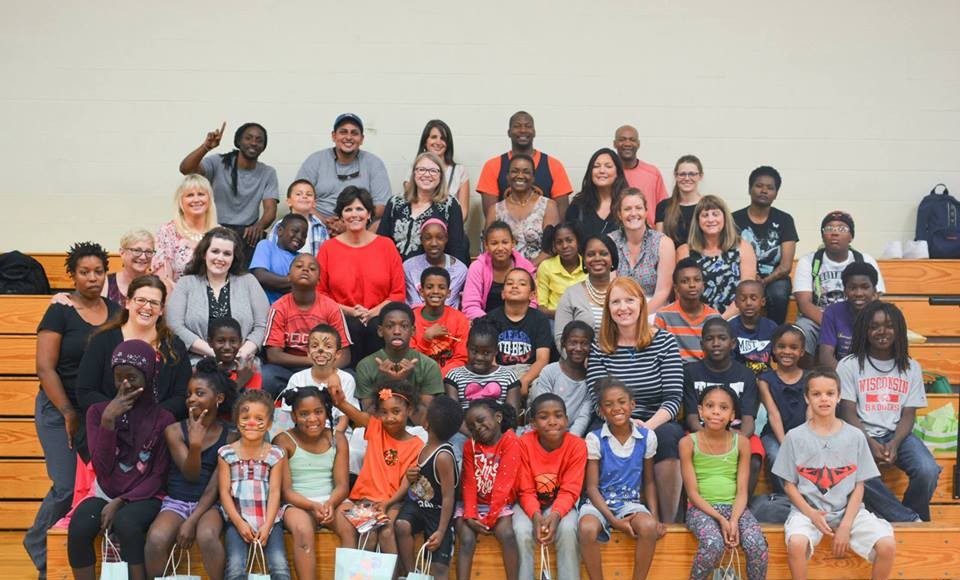One week after the 2013 release of the Race to Equity report highlighting the staggering gaps in achievement between white and non-white students in Dane County, Rowan Childs and Will Green, founder and CEO of Mentor Positive, Inc. and community center director at the Darbo Salvation Army, crossed paths with a shared passion for starting a literacy program.
Despite some improvement, the gaps in literacy and mathematics in Dane County still persist, but the Madison Reading Project — the brainchild of Childs and Green — is making strides to incorporate community in their efforts to increase the literacy rates for Madison’s underserved youth.

Located inside the Salvation Army Community Center in the Darbo-Worthington neighborhood on Madison’s east side, Madison Reading Project has an advisory board comprised of Childs, the director of the project, Green, local parents, mentors, and business owners, who all contribute to creating a holistic learning experience.
“It’s been really nice to get the community involved and actually come here and work with kids,” said Childs
Students involved in the project, who are primarily from the surrounding area, have read over 80,000 pages since the program’s start in February 2014.
But the program does not simply begin and end with the number of books a child can read; instead there is a value placed on the ability to be technology, globally, and culturally literate all while allowing the students to have agency in what and how they read.
“One of things we really do is encourage the kids to find anything they like to read, so whether it’s a comic book, or non-fiction, or a mystery; really just trying to get a variety of materials in,” said Childs.
The program recognizes the importance in exposing children of color to literature that reflects cultural, racial, and ethnic diversity.
“There are so many books that don’t include kids of color, so we really try to include books that do,” says Childs
The program’s library includes over 500 books that include both standard reading materials often taught in classrooms and literature that teaches about other culture within and outside of the United States. They program also has books written in Spanish.

The cultural education is not limited to literature though, as the program also partners with Africa Bridge, a program started by Childs’ father in 2002 to give back to his country of origin Tanzania, to connect its participants with students in rural Tanzania through sharing letters, artwork, photos, and emails.
Kids were even able Skype with students from Tanzania in an exchange of knowledge and ideas.
“Watching the kids interact for the first time, it was so good to see kids here in Madison talk to kids in Tanzania through an interpreter about ‘what are you going to do tonight after school,” said Paul Hager, CEO of Information Technology Professionals who provided technical support for the Skype call.
Madison Reading Project children were also able to choose an African country to read about and use that knowledge to raise money to fund 4 cows for their Tanzanian peers.
“The kids were able to realize the more we read, the more money we can raise to help someone else. In doing that the kids were able to help others instead of only always being the recipient of charity,” said Childs.
In addition to building global community each child in the program receives a local community mentor who they communicate with through letters and emails to increase their skills in reading, writing, and communication. Once a month the mentors visit their mentees at the center.
“They really write some personal letters and funny letters. It’s been really cool to see that bond grow,” said Childs, the founder and director of Madison Reading Project.
The newest addition to the Madison Reading Project is their new #SmartStartLab which was unveiled on July 28.
“One of the things we realized was that none of the kids, or hardly any of the kids had computers or Wi-Fi at home,” said Childs.
“If kids don’t have any technology at home how are they going to keep up with their peers or get their homework done because it has to be done on a computer?”
The lab features 15 brand new Hewlett-Packard all-in-one touch screen computers installed by Hager’s company.
The lab will be used to enhance literacy programs for both child and adult learners.
“This is great way to give everybody equal access to the latest technology. This a city of intellectuals and everyone should have an equal opportunity in reading, literacy, and technology,” said Hager

The Madison Reading Project is currently working on building and supplying six “Little Free Libraries” throughout the Darbo-Worthington community. The libraries, which were suggested and will be built by parents and local community leaders, will have both adult and children’s books.
Two of the libraries will be located near the Darbo Salvation Army and the others will be spread throughout the neighborhood.
The project is still collecting books and hopes to open the libraries by the end of the summer.










